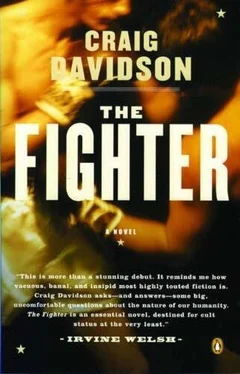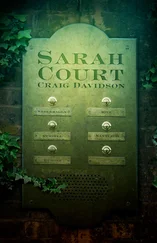Tommy threw back his head and roared. Rob and Reuben joined in — not for the punch line, which they’d heard a thousand times, but simply for the telling.
Paul’s head hit the canvas and things went dark and in the blackness he saw a chicken hatchery. The walls were ribbed sheet metal stretching into the dark, a cavernous place like a warehouse thick with an ammonia smell. A pool of light hung above a hatching pen as though a spotlight were trained on it, only there was no spotlight. The pen was constructed of small-gauge wire and filled with yellow chicks clustered at a tube spitting out cracked corn which they fought over with stunning viciousness. He saw a hen in there, too, a big sleek mama clucking and ruffling her pinfeathers as if agitated. She shifted her weight and a tiny beak poked out from under her dirty feathers, a beak opening and closing like a fish dying on a beach. A wing popped out under the hen, a wing without feathers flapping feebly, bone ends snagging the wire. The hen tucked the wing gently beneath her and kept on clucking and shifting, and finally she shook her feathers out and stepped off the pitiful thing she’d been sheltering.
The chick was withered and milk-pale and one of its claws, crushed close to its body, had torn a ragged hole in its side. One eye was a swollen mound trickling pus and the other had ruptured from being sat on, a shiny ball of blood. Its wings were smeared in shit and the print of the wire was pushed into its flesh, a deep hexagonal grid over one side of its body. Paul felt shocked and terrified and all shredded up inside as the thing thrashed, its beak opening and closing but not a sound coming out. The other chicks saw it lying there. They clustered around as it struggled to stand but its legs were withered and its wings nothing more than bones and it flopped on its side, breathing rapidly. The chicks bobbed up and down and shook their wings all out and stared on with dusky wet eyes. One pecked the sick one’s head and opened a hole there. One pecked at an eye and broke it. Then they were pecking fanatically and peeping with excitement while the mama watched without emotion and in the midst of the fluttering yellow bodies Paul saw that beak opening and closing, opening and closing—
“… aul…
Paul…”
The burn of ammonia filled his nostrils. He opened his eyes, blinked, squinted. The ring lights were set in steel lattices, a spot of total blackness at their centers.
He tried to sit up but couldn’t. It was like someone had taken a heavy mallet and nailed his gloves and boots to the mat. His opponent — Everett, a tattooed black kid — stood with his arms draped over the turnbuckle.
Lou said, “What’s your name?”
Paul worked his jaw. “Did I get… knocked out?”
“What’s your name?”
“Paul Harris. How long was I out?”
“Long enough. Can you see my fingers? How many am I holding?”
He’d been training six or seven hours a day, including a good deal of sparring. He’d taken bodyshots that filled his mouth with bile and clubbing blows that dropped him to one knee, but this was a fresh twist.
“Sneak uppercut,” Lou said. “Tickled you right on the knockout button.”
Everett came over and, in a belated gesture of concern, asked was Paul all right.
“You hit pretty hard.” Paul’s tone was gleeful. “Let’s get back at it.”
Lou stepped back through the ropes. “Go to it, then.”
The buzzer sounded. Everett streaked across the ring to catch Paul moving hesitantly out of his corner. Everett boasted an accurate jab, throwing it out on the end of his long left arm.
“Get down on your haunches!” Lou called at him. “You’re boxing like Frankenstein!”
The morning after his first training session Paul had awakened near-paralyzed, his tendons so tight he could barely walk. But he dragged himself back to the club and, after some crass ribbing from Lou — Y ou look like twice-pounded shit — kept at it. He took to running a five-mile circuit each morning, following a path along the train tracks to the Welland Canal where great shipping cranes slanted against the sky. He ran the steps connecting the club and paint store with a medicine ball; he hit the heavybag until his hands looked like ground chuck. Pushing his body, he found that it possessed limits beyond his reckoning. Muscle groups presented themselves: ice-cube-tray abs and a cobra’s hood of latissimus muscle; a trickledown map of blue veins running under skin gone translucent as rice paper.
Everett’s hand flashed and a polar whiteness expanded inside Paul’s skull. He gagged on his gumshield but got his gloves up; Everett’s punches glanced off his elbows.
“Keep your head down. You’re holding it out there like a lantern in a storm!”
Paul had been surprised at how quickly his body accommodated itself to pain — not only the mediated pain of training, but the immediate and unavoidable pain of the ring.
He’d been hit with such force that blood leapt from his nose like a grisly magic trick, yet he gathered himself and fought back. He discovered the miracle of adrenaline.
They circled, feinting and juking. Paul saw the curve of Everett’s torso, the smooth ladder of his ribcage. His fist could fit into that space, he reasoned, into the bundle of organs below Everett’s short rib.
When he threw the punch, turning on his lead foot and twisting his hips, the coiled momentum released his fist like a boulder from a catapult. The punch landed solid and the shock rebounded down his arm like the kickback of an elephant gun.
Everett made a small sound like a sigh and fell away from Paul’s glove.
“Whoa!”
Lou hopped up on the apron and ducked through the ropes.
Everett gulped for breath on the mat. Lou took the kid’s arms and held them up. A dark patch spread over the crotch of his boxing trunks. “Breathe, now, Ev. Find those lungs.”
Paul felt pretty damn pleased with himself. He envisioned Everett’s blood stunned in his veins, hardening like ice. He felt the displacement of Everett’s guts through his glove, the organs shifting in deference to his fist.
Lou helped Everett back to the change room. “That was some punch,” he said upon his return. “Like to bring down the walls of a city.”
“Just doing like you taught.”
Lou scratched under the brim of his paisley porkpie, lips pursed in an effort to recall what, if any, advice he’d offered Paul. “Well, you’re a good kid — you’re a listener!’ He whistled.
“Hit a guy that bad, you steal a piece of him forever.”
“It was a lucky punch.”
“Some of my prospects had half your hustle, they’d be champs. Hop in the ring.”
Lou shrugged on punch mitts and worked with Paul. The kid was raw as hell, a hundred and eighty-odd pounds of flailing flesh and bone, but the sting in Lou’s hands signaled one-punch power. That overhand left could scramble anyone’s brain.
“What was it you said you did?” Lou asked during a break. “Businessman of some sort?”
“Worked at a winery. I quit, though.”
“So why boxing?”
Paul spat on a blotch of blood marking the canvas. “I can’t say,” he said, scuffing the spot with his boot. “I needed to be stronger.”
“Muscles? Will power? How do you mean?”
He wanted to tell Lou about a World War I documentary he’d seen, these veteran soldiers talking about mercy kills. Back then, they said, if a man in your unit was a liability, you put a bullet in his brain and made it look like an accident. The murdered men were officers, silver spooners; the killers were working-class enlisted men. Out in the trenches the degrees on your wall didn’t matter, they said, nor that your father played tennis with the Duke of York. Out there it was, Do I trust this man with my life? Dog eat dog, the basic law of man, and the refinements of civilization a million miles away. The vets were not the least bit shamed by their actions — they considered it an act of mercy.
Читать дальше












